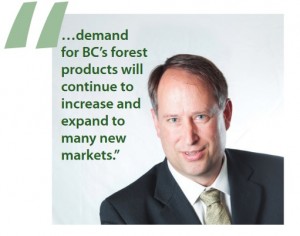What year did you graduate and from which program?
you graduate and from which program?
1983 – BSF (Harvesting)
Where did you grow up?
Revelstoke, B.C.
Why did you choose UBC Forestry?
I wanted a career in an applied science, with an outdoor orientation. My father also grew up in Sopron, Hungary (although not a forester) and the UBC connection was something that I was aware of many years prior to attending university.
What was your first job after graduation (related or not to your degree)?
Forestry Crewman – Downie Street Sawmills
What are you doing now and how did you end up there?
I am currently Senior Vice President – Forestry, Environment and Energy with Canadian Forest Products Ltd. (Canfor). I have spent the past twenty-seven years with Canfor, starting out in Chetwynd and with time in Prince George and Fort St James over the years. Looking back, the roles have been varied; Forestry Technician, Forestry Supervisor, Divisional Forester, Assistant General Manager, Woodlands Manager, General Manager, Regional Manager, and Vice President-Manufacturing. The company has always provided me with opportunities for personal growth and new challenges. I have had the opportunity to work with very talented and committed people within the company and the general industry as a whole.
What is your fondest memory of your time at UBC?
I have many. Doc Worrall’s Dendrology lectures and exams always had an interesting twist to them. The suspension bridge we constructed at the Loon Lake Research Forest for our grad class project, cinnamon buns at the Barn, Loggers Sports competitions, JV Basketball, the Open-House Canada Forestry Field trip to Fredericton with 43 fellow students. There are too many to capture here.
If you weren’t working where you are now what profession would you most like to try?
I would have pursued an engineering path if I had not decided on Forestry when I left High School. I think this still applies today.
What is the toughest business or professional decision you’ve had to make?
During the 2007 to 2009 period, many decisions to take production shifts down or close mills had to be made due to the collapse of the lumber market in the U.S. and the lack of demand for our products. I always found these the most difficult, due to the impacts they had on the people at the sites and their families.
What do you aspire to ten years from now (personally and/or professionally)?
Ten years is a long time. Personally, I expect to watch our four children, that Carolyn and I take great pride in, make their own way in the world while we move on to the empty nest stage. This should provide travel opportunities and more recreational opportunities with the friends we have made around B.C. and further afield. Professionally, I work today with a strong leadership team at Canfor, and we still have work to do and opportunities to pursue. The bio-energy area and bio-economy will be interesting to observe as it pertains to Forestry in B.C. in the coming decade.
Do you have any advice for students considering enrolling in forestry?
Forestry has always been an exciting and changing profession in British Columbia. With global populations continuing to grow and the green attributes of building with wood increasingly becoming apparent, demand for B.C.’s forest products will continue to increase and expand to many new markets. Now is the time to enroll in Forestry and whether you decide to pursue a career within industry, government, the consulting sector or elsewhere, your opportunities will only be limited by your aspirations.
From Branchlines March 2012